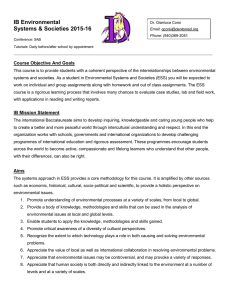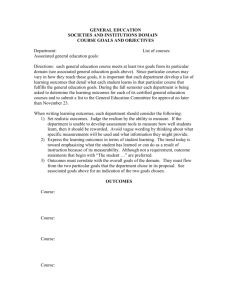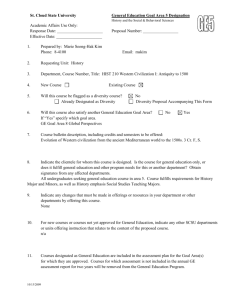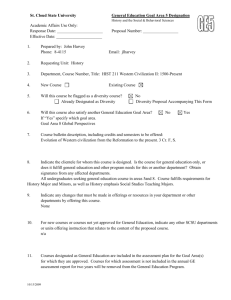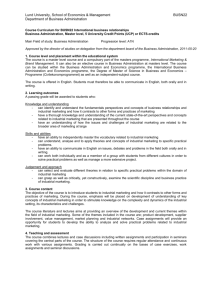Course Description: IB Environmental Systems and Societies
advertisement
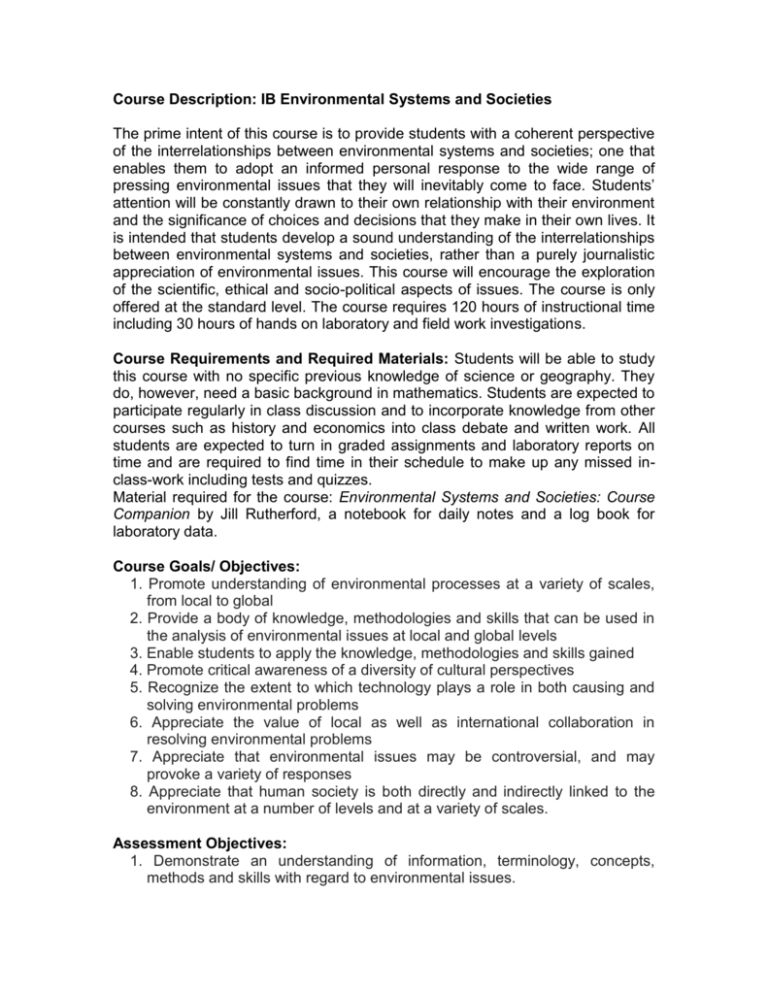
Course Description: IB Environmental Systems and Societies The prime intent of this course is to provide students with a coherent perspective of the interrelationships between environmental systems and societies; one that enables them to adopt an informed personal response to the wide range of pressing environmental issues that they will inevitably come to face. Students’ attention will be constantly drawn to their own relationship with their environment and the significance of choices and decisions that they make in their own lives. It is intended that students develop a sound understanding of the interrelationships between environmental systems and societies, rather than a purely journalistic appreciation of environmental issues. This course will encourage the exploration of the scientific, ethical and socio-political aspects of issues. The course is only offered at the standard level. The course requires 120 hours of instructional time including 30 hours of hands on laboratory and field work investigations. Course Requirements and Required Materials: Students will be able to study this course with no specific previous knowledge of science or geography. They do, however, need a basic background in mathematics. Students are expected to participate regularly in class discussion and to incorporate knowledge from other courses such as history and economics into class debate and written work. All students are expected to turn in graded assignments and laboratory reports on time and are required to find time in their schedule to make up any missed inclass-work including tests and quizzes. Material required for the course: Environmental Systems and Societies: Course Companion by Jill Rutherford, a notebook for daily notes and a log book for laboratory data. Course Goals/ Objectives: 1. Promote understanding of environmental processes at a variety of scales, from local to global 2. Provide a body of knowledge, methodologies and skills that can be used in the analysis of environmental issues at local and global levels 3. Enable students to apply the knowledge, methodologies and skills gained 4. Promote critical awareness of a diversity of cultural perspectives 5. Recognize the extent to which technology plays a role in both causing and solving environmental problems 6. Appreciate the value of local as well as international collaboration in resolving environmental problems 7. Appreciate that environmental issues may be controversial, and may provoke a variety of responses 8. Appreciate that human society is both directly and indirectly linked to the environment at a number of levels and at a variety of scales. Assessment Objectives: 1. Demonstrate an understanding of information, terminology, concepts, methods and skills with regard to environmental issues. 2. Apply and use information, terminology, concepts, methodologies and skills with regard to environmental issues. 3. Synthesize, analyze and evaluate research questions, hypotheses, methods and scientific explanations with regard to environmental issues. 4. Using a holistic approach, make reasoned and balanced judgments using appropriate economic, historical, cultural, socio-political and scientific sources. 5. Articulate and justify a personal viewpoint on environmental issues with reasoned argument while appreciating alternative viewpoints, including the perceptions of different cultures. 6. Demonstrate the personal skills of cooperation and responsibility appropriate for effective investigation and problem solving. 7. Select and demonstrate the appropriate practical and research skills necessary to carry out investigations with due regard to precision. Assessment/ Grading Procedure: Students are expected to complete and turn in weekly IB practice questions. These and other graded homework assignments comprise 20% of each student’s grade. There are also tests at the end of each unit and regular laboratory reports. Shorter laboratory reports and quizzes account for 30% of the student’s grade and tests and longer lab reports are worth 50% of the grade. Classroom Policies: Students are expected to arrive on time to class with their textbooks, notebooks and any due assignments. Participation is a class requirement and there are many ways to be involved in class. Students should not only present their own opinions in class but also, listen and respect the opinions of classmates. Students are expected to take notes and to keep all classwork in their notebooks. However, the instructor will not be checking to ensure that students take careful notes. Students are expected to be self-motivated and responsible for their own note taking methods. Students are encouraged to ask questions in class, but should come see the instructor outside of class for clarification of specific assignments before they are due. The students will also be required to design and carry out individual experiments. All laboratory reports must be done individually. If a lab group has the same results from an experiment, it is required that each student do his or her own data analysis and presentation independently.
